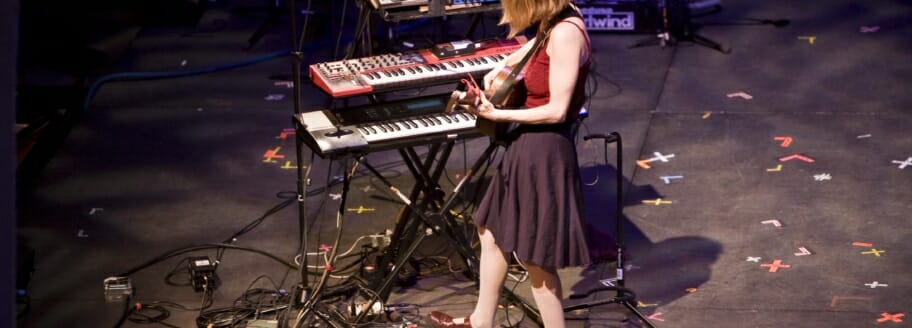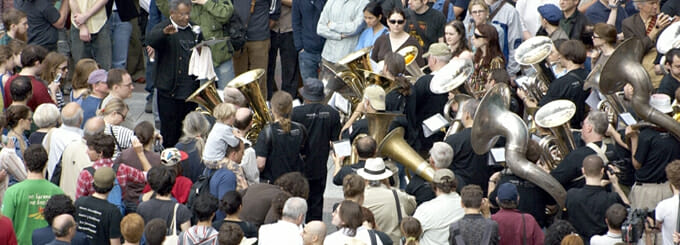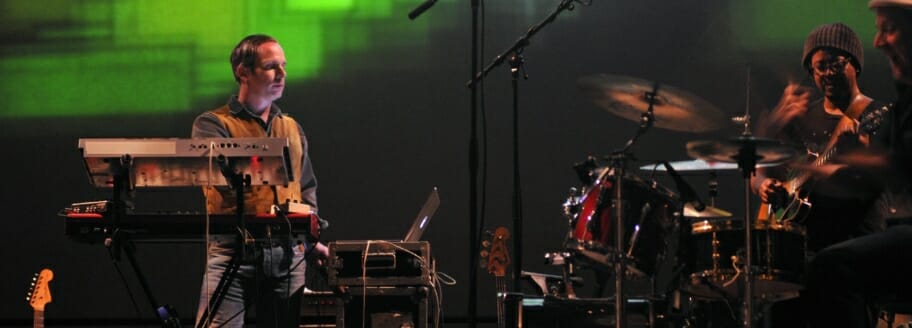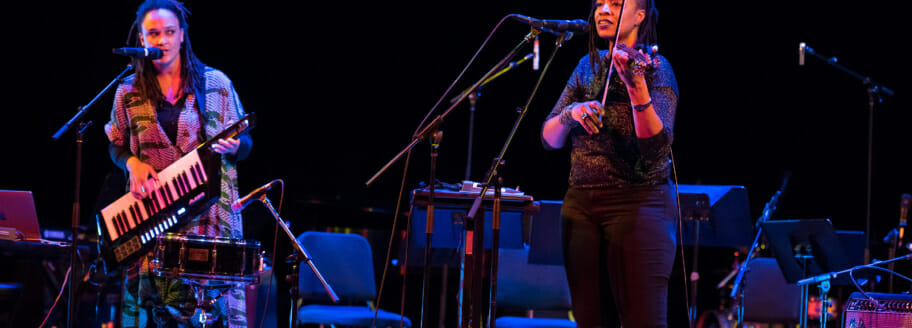The Marathon is a diverse, open and exciting music event. “Imagine Lollapalooza advised by the ghost of John Cage,” Vanity Fair wrote. “There are other places to hear new contemporary music, but it is seldom offered with such a potent blend of intensity, authority, and abandon.”
Through the Marathon, Bang on a Can aimed to generate an inclusive worldwide community dedicated to innovation through music – a world where ideas flow freely across boundaries whether they are musical, geographical, spiritual. Co-founders Michael Gordon, David Lang, and Julia Wolfe explain,
“In 1987, we started dreaming of the world we wanted to live in. It would be a kind of utopia for music: all the boundaries between composers would come down, all the boundaries between genres would come down, all the boundaries between musicians and audience would come down. Then we started trying to build it. Building a utopia is a political act – it pushes people to change. It is also an act of resistance to the things that keep us apart.”
Composers Gordon, Lang and Wolfe created the first Bang on a Can Marathon concert in 1987 in order to break down the barriers that separate musical communities. Their idea was simple: instead of sorting music by style, genre, or venue it would be more powerful to group music by innovation, finding the rebels in each musical community, the restless creators not content to leave conventions unchallenged. Putting all of these fresh voices back to back on one gargantuan concert would allow the audience to experience the excitement of the innovation and breadth of vision. Their first Marathon, in the Exit Art Gallery in Soho, featured appearances by such leading lights as Steve Reich, John Cage, Pauline Oliveros and Milton Babbitt, alongside music by young composers whose musical voice had no home.
Since then, the marathons have included an astounding range of revolutionary music and musicians, from John Cage to John Zorn, from minimalism’s godfather Terry Riley to Sonic Youth’s Thurston Moore, from the 30-voice Finnish shouting choir Huutajat to the hyper-intelligent brutality of Iannis Xenakis, from the political sophistication of composer/pianist Frederic Rzewski to the high energy strumming of Japan’s Kazue Sawai Koto ensemble, from the eastern minimalism of Arvo Pärt to the indie-rock stylings of Kaki King, from the brainy rituals of Karlheinz Stockhausen to the turntable manipulations of artist Christian Marclay and the pulsing electronic beats of Dan Deacon, alongside the new voices of hundreds of younger and unknown composers. It is in the range of these musics that one sees how big the world really is, and how big it can be.
The Marathon has been all over New York City from Exit Art Gallery to the R.A.P.P. Arts Center, La Mama, the Kitchen, the Society For Ethical Culture, Lincoln Center’s Alice Tully Hall, PACE University, the Henry Street Settlement, the Brooklyn Academy of Music, Symphony Space, to the Winter Garden at Brookfield Place. Out of town Bang on a Can Marathons have been presented annually at Mass MoCA, spotlighted in the US from San Francisco to Baton Rouge, and overseas in London, Amsterdam, Hamburg, and more.
What links all of these marathons is the range and diversity of radical new music, the passion and intensity of the performances, and the enthusiastic response of a broad listening public. Bang on a Can believes that the marathon concert helps to build the world in which we want to live, in which new ideas have meaning and new voices are heard.
When the pandemic paused all live performances for 2020 and 2021, we moved our Marathons online, with our first one being presented in May 2020.
Explore Marathons past on CanLand, including audio, video, posters, programs and other memorabilia dating all the way back to 1987!
Watch the 2017 Marathon at the Brooklyn Museum




